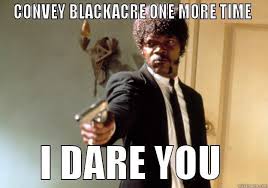One might think that with the presumptive four-day weekend, there would be no opinions this week. One would be wrong. Two opinions issued on Wednesday.
The first opinion is about a property dispute. In a nutshell, a married couple noticed that a parcel of land—that neighbor was using—was seemingly omitted from neighbor's deed. So, without talking to said neighbor or confirming that a previous owner's heirs, in fact, owned the parcel, they "arranged for the heirs of a previous owner of the land to deed that parcel to them." They recorded the deed, told neighbor that they owned it, and told her to remove her stuff. Neighbor sued the married couple and the heirs. Ultimately, the trial court granted summary judgment to neighbor, and, after a trial, found that husband (alone) had slandered neighbor's title. The married couple appeals.
SCOV goes through the couple's issues with the trial court's grant of summary judgment, concluding that none of the issues raised require reversal. Turning to the slander-of-title issue, SCOV reasons that the elements of the claim are present; plaintiff proved those elements to the trial court's (and to SCOV's) satisfaction. The opinion is worth a read if dealing with any slander-of-title issues because it gives a good breakdown and discussion of the elements of such a claim. Finally, SCOV concludes that, in Vermont, attorney's fees are part of the special damages available in a slander-of-title claim.
Because SCOV concludes that the trial court's grant of summary judgment to plaintiff was appropriate; that plaintiff's title relates back; that there was a slander of title and that the special damages (attorney's fees) for her slander-of-title claim were appropriate, this one gets affirmed. Massucco v. Kolodziej, 2024 VT 76.
Next up is a case dealing with a promissory note. The trial court declined to award attorney's fees on the note, even though the note contained such a provision, because the trial court found that the promissory note didn't reflect the true agreement of the parties. Because the trial court failed to find ambiguity in the note and because the note is not otherwise unconscionable, SCOV reverses, holding that "the promissory note is enforceable according to its terms."
The moral of this story is "always read before you sign." The promissory note was in regard to some cattle that were being purchased by plaintiff and defendant and it required defendant to reimburse plaintiff for the purchase price of the cattle and pay attorney's fees in the event plaintiff had to enforce the agreement. Before the parties signed papers, a couple proposals were made by plaintiff and rejected by defendant. On "signing day," when plaintiff handed defendant a bunch of paperwork and asked defendant whether he was going to read the papers before he signed them, defendant said, more or less, "Why would I? I trust you. Don’t you trust me?"
Flash forward to the breakdown of the relationship and litigation. the trial court found that although defendant had signed the promissory note, he didn't know what he was signing. So, while the trial court found that plaintiff was entitled to judgment and prejudgment interest, the promissory note—and its attorney's fees provision—were unenforceable because the parties never actually agreed on terms.
Plaintiff appeals. On appeal, SCOV notes that generally, when someone signs a contract, they're going to be held to it, absent ambiguity. And people are presumed to have read contracts they sign. "Defendant's failure to read the promissory note before signing it, and after plaintiff encouraged him to do so, without more, is not a defense to enforcement."
Thus, SCOV concludes that the promissory note is enforceable according to its plain and unambiguous terms and reverses and remands. Falcao v. Richardson, 2024 VT 78.

Comments
Post a Comment